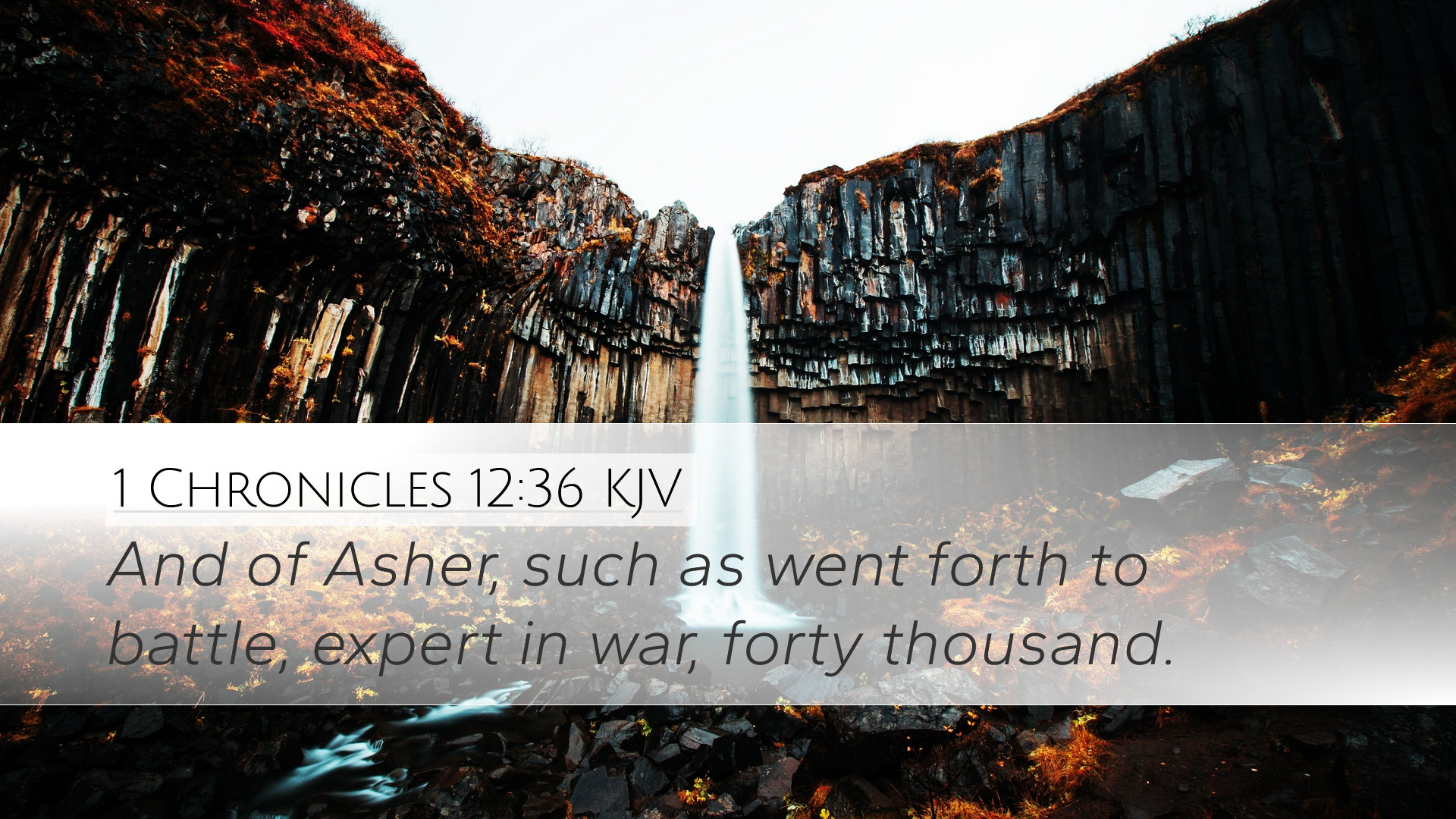Commentary on 1 Chronicles 12:36
Verse: 1 Chronicles 12:36 - "And of the children of Ephraim, twenty thousand and eight hundred, mighty men of valour, famous throughout the house of their fathers."
Introduction
This verse highlights a significant aspect of the tribal contributions to the ranks of David's army, specifically focusing on the Ephraimites. Scholars and theologians have long debated the implications of these numbers and the characteristics of the warriors described. By synthesizing the insights from public domain commentaries, we can delve into the meaning of this passage and its implications for understanding the strength of God's people.
Contextual Setting
The Chronicles serve as a historical account that emphasizes the significance of the Davidic dynasty and the worship of God in Israel. The author meticulously details the tribes that rallied to support David, thus affirming the unity and strength of the nation. The Ephraimites, traditionally known for their formidable fighting skills, play a crucial role in this narrative.
Insights from Commentaries
Matthew Henry's Commentary
Henry notes that the inclusion of Ephraim's warriors illustrates the diversity and considerable strength of David's forces. He emphasizes that these men were "mighty men of valour," suggesting not only physical prowess but a commendable reputation among their peers. This suggests that valor in battle is closely tied to one’s family legacy, an aspect that enhances their honor within the community.
Moreover, Henry indicates that the mention of "famous throughout the house of their fathers" implies a lineage of strength and valor, aligning with the biblical principle that family honor impacts identity and personal courage. This reinforces the idea of collective legacy in Israel's history, urging modern readers to consider the weight of family and faith in their lives as well.
Albert Barnes' Notes
Barnes expands on the military implications of this verse, noting the strategic importance of having such a formidable number of warriors from Ephraim, which was one of the largest tribes. He highlights the importance of unity among the tribes, particularly as they joined under David’s leadership. He interprets their valor and fame as indicative of God’s providence in raising up capable leaders and warriors for His purposes.
In addition, Barnes discusses the significance of these men being drawn from Ephraim, a tribe that had previously shown division and strife. The cohesion of the Ephraimites in this context signifies a turning point; it embodies a model of restoration under God’s guidance, which serves as an encouraging lesson to contemporary readers about the power of divine unity and purpose in community.
Adam Clarke's Commentary
Clarke focuses on the numbers presented in the text, interpreting the count of "twenty thousand and eight hundred" as a healthy representation of military might. He reiterates that the Ephraimites were recognized for their bravery which was not simply born out of physical strength but also from their zeal for David, having rallied to his side during critical moments.
Clarke also notes that being "famous throughout the house of their fathers" speaks to a built tradition of bravery and valiance that had been passed down. This idea aligns with the biblical notion of inheritance of character traits and values, thus challenging modern believers to consider what legacy they will leave behind through their actions and faithfulness to God.
Theological Reflections
The combined insights from these commentaries remind us that God often raises up unlikely leaders and strong warriors from various backgrounds. The Ephraimites symbolize the broader category of God’s chosen people, where expertise in battle does not only involve physical skills but also a deep commitment to divine purpose and the kingdom of God.
Legacy and Valor
This verse compels us to examine our identity within the body of Christ. Just as the Ephraimites were renowned within their families and tribes, modern Christians are called to reflect valor in their faith and community.
- Honor in Legacy: The concept of valor extends beyond physical might to embody spiritual integrity and leadership.
- Unity in Diversity: The collaborative effort of distinct tribes showcases the importance of unity in the body of Christ today.
- Divine Empowerment: Just as God empowered the Ephraimites, He continues to empower His people for service and impact in the world.
Conclusion
1 Chronicles 12:36 serves as a reminder of the capabilities that lie within the community of believers. By reflecting on the insights from respected theologians and scholars, we are encouraged to embrace our call to valor, both within our families and in the Church. As the Ephraimites exemplified strength and reputation, modern believers should actively cultivate a legacy of faith that resonates through generations.


